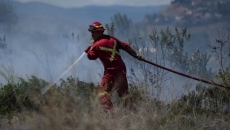British Columbia's coroner says drug toxicity is the leading cause of death in the province for those aged 10 to 59, far larger than homicides, suicides, accidents and natural diseases combined.
The statistic comes as the latest figures are released for August, saying there were 174 toxic-drug deaths last month.
The numbers represent the lowest monthly death toll recorded since June of 2022, however the coroners' service cautions that the data is preliminary and could change as investigations are completed.
More than 1,600 people have died in the first eight months of this year, bringing the number of overdose deaths in the province to almost 13,000 since a public-health emergency was declared in April 2016.
A statement from the coroner says almost two-thirds of those who died in 2023 smoked their drugs, underscoring the need for safe spaces to consume drugs.
Chief Coroner Lisa Lapointe says the relentless scale of the public-health crisis requires a proportionate response, and it continues to recommend urgent collaboration from government ministries to save lives.
"Improvements in the quality and reach of harm reduction and evidence-based treatment services are essential, as is the critical need to ensure that those at risk of dying can access safer, regulated drugs. If we cannot implement these changes, our loved ones will continue to die," Lapointe says in the statement.
The highest rates of death this year have been in the Northern Health region, where 58 people per 100,000 have died, while that number is 56 per 100,000 in the Vancouver Coastal Health region.
The coroner's statistics show 70 per cent of the deaths were people aged 30 to 59 and 78 per cent of those were male.
Mental Health and Addictions Minister Jennifer Whiteside says in a statement that it's clear that communities across B.C. are grappling with the devastating effects of the toxic-drug crisis.
"Building on what we have learned, we are focusing on early intervention and expanding support services everywhere," she says in a statement.






